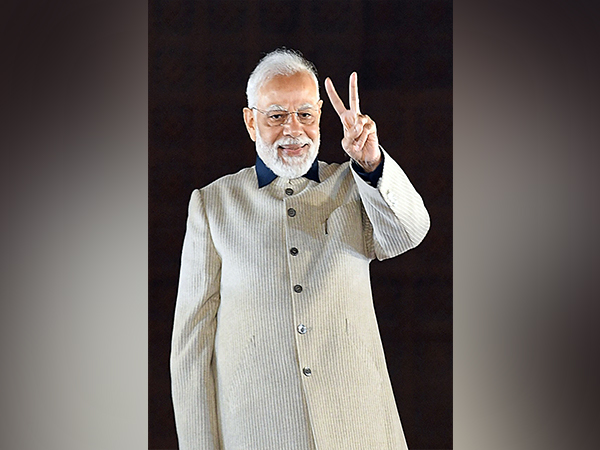Modi popular among Chinese netizens, nicknamed 'Modi the immortal': Article
Prime Minister Narendra Modi is reverentially called Modi Laoxian meaning Modi the immortal by Chinese netizens, a rare respectful reference to an international leader, notwithstanding the bitter India-China border row, according to an article published in the US-based strategic affairs magazine The Diplomat.In the article - How is India viewed in China, Mu Chunshan, a journalist known for analysing Chinese social media, especially Sina Weibo, akin to Twitter in China, also said that most Chinese feel that India led by Modi can maintain a balance among major countries in the world.

- Country:
- China
Prime Minister Narendra Modi is reverentially called 'Modi Laoxian' meaning 'Modi the immortal' by Chinese netizens, a rare respectful reference to an international leader, notwithstanding the bitter India-China border row, according to an article published in the US-based strategic affairs magazine The Diplomat.
In the article - 'How is India viewed in China?', Mu Chunshan, a journalist known for analysing Chinese social media, especially Sina Weibo, (akin to Twitter in China), also said that most Chinese feel that India led by Modi can maintain a balance among major countries in the world. Sina Weibo has over 582 million active users.
''Prime Minister Narendra Modi has an unusual nickname on the Chinese internet: Modi Laoxian. Laoxian refers to an elderly immortal with some weird abilities. The nickname implies that Chinese netizens think Modi is different – even more amazing – than other leaders,'' he said.
They point to both his dress and physical appearance, seen as Laoxian-like, and some of his policies, which are different from India’s previous ones, Mu said.
On India's relations with other major countries, he said, whether it is Russia, the United States, or Global South countries, India can enjoy friendly ties with all of them, which is ''very admirable'' to some Chinese netizens.
''So the word 'Laoxian' reflects the complex sentiment of Chinese people toward Modi, combining curiosity, astonishment, and perhaps a dash of cynicism,'' Mu wrote.
''I have been doing international media reports for nearly 20 years and it is rare for Chinese netizens to give a nickname to a foreign leader. Modi’s nickname stands out above all others. Clearly, he has made an impression on Chinese public opinion,'' he said.
Besides hosting Chinese President Xi Jinping and former Premier Li Keqiang, since he came to power in 2014, Modi also held two rare informal summits with Xi, 69, in Wuhan and later in Mamallapuram near Chennai, which raised expectations of improvement in the relations between the two Asian giants.
The Sino-Indian relations hit the bottom following aggressive military actions by the Chinese military in eastern Ladakh violating the agreements to resolve the border dispute leading to a nearly three-year-long military standoff.
The two countries have held 17 rounds of high-level military commanders' talks to resolve the standoff.
India has been maintaining that ties with China cannot be normal unless there is peace in the border areas.
Modi is also well known in China as he interacted with the Chinese public through his account on Sina Weibo which he opened in 2015 and had over 2.44 lakh followers.
However, he quit Weibo in July 2020 after the Indian government moved to ban 59 Chinese Apps to send a “strong message at the border, on the economic front and at a personal level too,” according to BJP general secretary (organisation) B L Santhosh. In his article, Mu says Chinese views of India are very complicated – but generally based on a sense of superiority and self-confidence.
Significantly, he writes that the Chinese netizens believe China’s attempts to use its “all-weather ally”, Pakistan as “unrealistic” as the gap between the two South Asian neighbours is “getting wider”, an apparent reference to the political and economic meltdown Pakistan is currently experiencing. ''The facts over the past nine years have proved that China and India have more room for cooperation. For example, China’s trade with India is worth USD115 billion a year – far more than China’s trade with Pakistan, which sits at around USD 30 billion”, Mu wrote.
''Of course, China has not forgotten Pakistan. But many Chinese netizens have a realistic view of the two South Asian neighbours. The argument is very sober: The idea of using Pakistan to restrain India is becoming more unrealistic because the gap between Pakistan and India is getting wider”, he said.
He also writes about Chinese apprehension about India’s growing popularity with western countries, especially with the US and New Delhi’s handling of the Ukraine crisis without disrupting its close ties with Russia and America. ''This is just one example of a widespread perception in China: India is the favourite of the West, while China has become the target of the West. How did India manage this? Why is India’s circle of international friends so big?” was the question debated by the Chinese netizens.
Most Chinese people feel a sense of superiority and self-confidence vis-a-vis India and of course, most Chinese people don’t like to see India get too close to the United States, but they also think China and India can still cooperate, the article said.
(This story has not been edited by Devdiscourse staff and is auto-generated from a syndicated feed.)
ALSO READ
Russia's Relentless Assault on Ukraine's Energy Infrastructure
Protracted Conflict: Russia’s Enduring Struggles in Ukraine
Terror from the Skies: Russia's Relentless Strikes on Ukraine
Pope Leo's Urgent Plea: Peace for Ukraine Now
Russia Launches Massive Overnight Missile and Drone Assault on Ukraine










